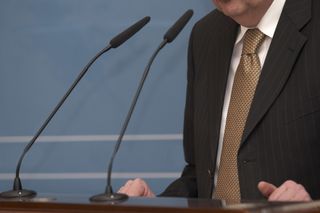Party leaders use Facebook and YouTube as debate platform
Brown, Cameron and Clegg will answer the public's favourite questions online as social media's involvement in the general election goes into overdrive.

Britain's three main party leaders have agreed to take part in a series of online 'digital debates' on Facebook and YouTube in the run-up to the 2010 general election.
Gordon Brown, David Cameron and Nick Clegg will represent Labour, the Conservatives and the Lib Dems respectively in the debates the first time the internet has ever been used as a platform for political discussion.
The three will face questions posed by members of the public, with their answers broadcast on Facebook and YouTube.
Users of the two sites can pose questions in either text or video form in a choice of five categories: economy, health and education, law and order, foreign policy and miscellaneous. A public vote will identify the two most popular questions in each category, which will then be presented to the party leaders, who have pledged to respond no later than April 28, 10 days before election day.
While this means the politicians will be given plenty of time to frame a considered response, unlike the forthcoming three live television debates another election first the move is nonetheless being seen as opening up a new avenue for political parties to engage with voters.
"Although the televised debates will be a historic first, we feel that that there is an opportunity for a different type of platform that allows voters to be in charge of the questions," said Google's director of communications Peter Barron. "By collaborating with Facebook to put together one initiative we hope to enable as many voters as possible from across the UK to take part."
Facebook's director of policy, Richard Allan, said the "dawn of the digital election" was a "transformative moment for democracy in Britain".
Get the ITPro. daily newsletter
Receive our latest news, industry updates, featured resources and more. Sign up today to receive our FREE report on AI cyber crime & security - newly updated for 2024.
"By allowing voters to cross-examine their leaders, these digital debates will put the voters firmly in charge," Allan said. "This marks a decisive shift away from the constraints of top-down traditional media and will take full advantage of unique scale and reach of Facebook, thus changing the way that politicians campaign for good."
The use of social media has already featured widely in the run-up to this year's general election as politicians desperately seek to tap into a market that has either never been eligible to vote in the past, or has chosen not to.
In addition to the 'digital debates', Facebook has teamed up with the Electoral Commission to try and sign up new voters ahead of election day. Facebook users visiting the site from Saturday have been asked whether they had registered to vote. If the answer is 'no', they are sent to a special page where they can enter their details and then print out a personalised voter registration form to be posted to the local electoral office.
Most Popular





